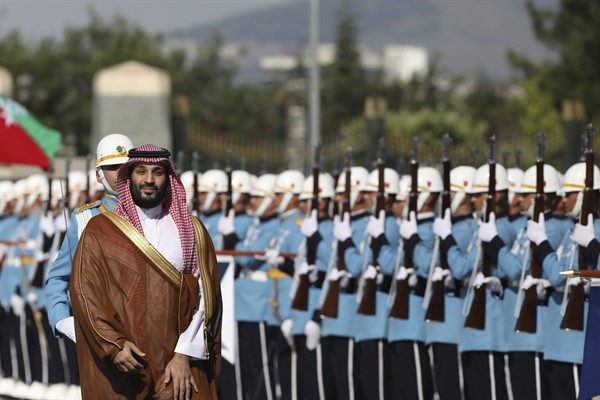The administration would therefore be wise to appraise the kingdom’s position more realistically, while still leveraging its reengagement with the Saudis in a manner that maximizes the benefits to U.S. national interests and advances the stability of the region. Clearly, and among the administration’s avowed objectives, Washington must push for a substantive increase in Saudi and OPEC oil production as a sine qua non for further U.S. security support. The relief on global oil prices offered by such an increase would not be felt in the short term, nor perhaps even in the medium term. But over time its impact would likely help weaken Russia’s leverage over Washington’s Western European allies as well as deprive Moscow of the revenues it uses to support malignant actors in the region, including Syria. Second, U.S. reengagement with Saudi Arabia should be the catalyst for some resolution to the brutal conflict in Yemen. Indeed, substantive steps in this direction are already underway. In February, the administration removed Yemen’s Houthi rebels from the U.S. list of foreign terrorist organizations, paving the way for increased contact and dialogue with the Houthis as well as the delivery of much-needed humanitarian aid. U.S. Secretary of State Antony Blinken has held talks with Rashad al-Alimi, head of the newly installed Yemeni Presidential Leadership Council, reaffirming U.S. support for the ongoing truce talks. And in mid-June, the United Nations special envoy for Yemen, Hans Grundberg, announced an extension of the previously agreed cease-fire on the ground, allowing for further progress in ongoing discussions toward a final settlement of the conflict. Biden should underline that future increases in security assistance to Saudi Arabia and its UAE allies would be conditioned upon Saudi restraint in its military actions in Yemen and its support for the U.N.-sponsored truce and political dialogue. Finally, reengagement with the Saudis—as well as increased security and intelligence assistance from both the U.S. and, covertly, Israel—would afford Saudi Arabia the security breathing space it needs to support, or at least not actively oppose, efforts to revive the multilateral nuclear deal with Iran, known formally as the Joint Comprehensive Plan of Action, or JCPOA. A more militarily secure Saudi Arabia, combined with a Russia chastened by its ill-advised invasion of Ukraine, would offer the best chance at peacefully restraining Iran’s nuclear ambitions. No amount of Saudi money or public relations can obscure the kingdom’s dismal human rights record or its role in the murder of Jamal Khashoggi. But Saudi Arabia is an inherently influential power in the Middle East, one that is steadily reemerging as an active participant in the politics of that perennially unstable region. The U.S. cannot marginalize the kingdom indefinitely, and Washington keeps Riyadh at arm’s length at its own peril. The Biden administration’s recent overtures to the Saudis, and the president’s announced trip to the kingdom, presage a needed reengagement. The administration can and must leverage that reengagement to hasten the resolution of several simmering conflicts, thereby returning a modicum of stability to the region, while further advancing U.S. interests in the process.The Biden administration would be wise to appraise Saudi Arabia’s position more realistically, while still leveraging its reengagement with Riyadh to benefit U.S. national interests and advance regional stability.
Frank J. Mirkow is a Washington-based corporate attorney with extensive experience living and working in the Middle East.

